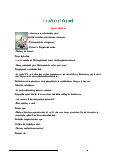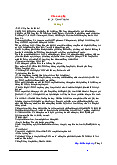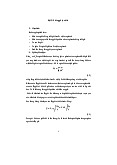



















Preview text:
Running head: THE POWER OF LISTENERS 1
THE POWER OF LISTENERS: HOW LISTENERS TRANSFORM STATUS AND CO- CREATE POWER Anat Hurwitz New York University Avraham N. Kluger
The Hebrew University of Jerusalem Author Note
This research was supported by grants from the Recanati Fund at the School of Business
Administration, and The Israel Science Foundation (grant No. 145/12) to the second author.
The authors thank Shoham Chosen-Hillel and Tammy Rubel - Lifschitz for comments on
an earlier version of this paper.
Correspondence concerning this article should be addressed to Anat Hurwitz, Leonard N.
Stern School of Business, New York University, Henry Kaufman Management Center, 44 West
Fourth Street, New York, NY 10012. E-mail: ahurwitz@stern.nyu.edu THE POWER OF LISTENERS 2 ABSTRACT
Good listening is highly acclaimed and often prescribed in both theory and practice.
However, although myriad of benefits associated with listening, good listening remains strikingly
scarce. We propose a social-status framework to explain the puzzling scarcity of good listening
with status-costs, and to expand existing knowledge with status-benefits. In a vignette
experiment (Study 1) and a recall experiment (Study 2), we show that listening entails a social
status trade-off, such that good listeners are granted higher prestige. We suggest that the key to
understanding the scarcity of listening is the potential dominance loss caused by good listening.
However, we also suggest that good listening has the potential to increase prestige, an important
benefit, largely over-looked, that runs counter to the notion that listening signals low status (e.g.,
Henrich & Gil-White, 2001; Dovidio & Ellyson, 1982). In addition, we suggest and show that
good listening affects the dyadic power structure: augmenting both listener and speaker’s
experienced power, and diminishing their perceived power disparity, thus creating mutual-power
enhancement (MPE). Finally, to further unpack this mutual empowerment, we show that good
listening increased listeners’
(power stemming from enabling others). facilitation power
Keywords: Listening, Dominance, Prestige, Facilitation power. THE POWER OF LISTENERS 3
THE POWER OF LISTENERS: HOW LISTENERS TRANSFORM STATUS AND CO- CREATE POWER
“When people talk, listen completely. Most people never listen” (Ernest Hemingway).
How often have you said, felt, or heard “you’re not listening to me!”? Although this experience
may be frustrating and painful, it is surprisingly common. We set to explore why good listening
is so uncommon, by investigating the costs and benefits of good listening on social status.
Specifically, we propose that good listening may actually hinder the attainment of a certain form
of social status (dominance), while promoting another form of social status (prestige), along with
the many additional psychological and relational benefits.
Vast research in psychology and organizational behavior has shown that good listening
produces a myriad of benefits for both speakers and listeners. For example, speakers benefit
from good listening by experiencing personal growth (e.g., Rogers, 1951), psychological safety
(Castro, Kluger, & Itzchakov, in press), job satisfaction (Brownell, 1990; Lloyd, Boer, Kluger, &
Voelpel, 2015) and relational satisfaction (Canlas, Miller, Busby, & Carroll, 2015; Katz &
Woodin, 2002), as well as lower depression (Segre, Brock, & O'Hara, 2015), anxiety (Nugent &
Halvorson, 1995), and burnout (Pines, Ben-Ari, Utasi, & Larson, 2002). In addition, good
listening produces higher quality narratives among speakers (Bavelas, Coates, & Johnson, 2000),
consequently influencing their self-knowledge (Pasupathi & Rich, 2005), and identity
development (Pasupathi, 2001). In parallel, good listeners appear to be better performers
(Bergeron & Laroche, 2009; Levinson, Roter, Mullooly, Dull, & Frankel, 1997), better liked by
their interlocutors (Lopez-Rosenfeld et al., 2015; Mein, Fay, & Page, 2016), trusted (Drollinger
& Comer, 2013; Lloyd et al., 2015), and perceived as people leaders (Ames, Maissen, &
Brockner, 2012; Berson & Avolio, 2004; Kluger & Zaidel, 2013). Juxtaposing these benefits for THE POWER OF LISTENERS 4 speakers
listeners, suggests that good listening can constitute a and
high-quality connection; one
that is mutually growth fostering, enhancing and promoting the development of both dyad
members as well as the tie between them (Dutton & Heaphy, 2003; Miller & Stiver, 1997).
Despite these benefits, people and professionals spanning the gamut of occupations (e.g.
medicine, sales, management, and education) complain that people do not listen. For example,
listening is the most deficient skill of CEOs, according to a survey of board members (Larcker,
Miles, Tayan, & Gutman, 2013). Similarly, although listening was found to be the most valued
communication skill in the workplace (more than presenting and talking) - it is the least
emphasized and taught in business schools (Brink & Costigan, 2014). In addition, Tyler (2011)
suggested that the scacrity of good listening is often exacerbated in organizations by its reduction
to a set of instrumental tips and techniques far removed from genuine listening.
This puzzling reality suggests that the cost side of listening may not fully be accounted
for. We suggest that to understand the surprising scarcity of good listening (despite its multitude
of benefits), we must consider the underlying costs as well. We propose that one major reason
people fail to listen is that listening may entail forgoing social status based on dominance (cost).
Yet, we also suggest that when people listen well they may gain social status based on prestige.
In addition, when people listen well, they trigger a process that reduces listener-speaker-power
disparity, increasing their own facilitation power as well as their own and the speaker’s sense of power. Listening
We define good listening as a behavior that combines attention, understanding (the
message as well as the speaker’s underlying needs), and benevolent motivation towards the
speaker. This is similar to current definitions (Bodie, 2012; Castro et al., in press), and echoes THE POWER OF LISTENERS 5
the classical view offered by Carl Rogers (1951), who saw good listening as consisting of a
genuine presence and effort to understand what the other person is saying, being empathetic and
non-judgmental, while regarding the other with respect and curiosity. Importantly, while this
definition is multidimensional, when people evaluate whether they are being listened to, they
appear to form a global evaluation that encompasses all these dimensions (Schroeder, 2016).
Listening and Social status
Social status—the degree of influence one possesses over resources, conflicts and groups
decisions (Berger, Rosenholtz, & Zelditch, 1980; Bourdieu, 1984; Cheng, Tracy, & Henrich,
2010; Flynn, Reagans, Amanatullah, & Ames, 2006) is considered a fundamental human concern
and motivation (Anderson, Hildreth, & Howland, 2015), strongly associated with increased
fitness and well-being (e.g., von Rueden, Gurven, & Kaplan, 2010). Therefore, status attainment
attempts are abundant in the way people interact in general and, what we suggest, in the way they listen in particular.
To explain the effects of listening on social status, we build on the dominance-prestige
account of social hierarchy which distinguishes between dominance and prestige; two (effective)
strategies people use to attain social status (Cheng, Tracy, Foulsham, Kingstone, & Henrich,
2013; Cheng et al., 2010; Henrich & Gil-White, 2001). Dominance refers to the use of force,
intimidation, and coercion to induce fear, created primarily by taking, or threatening to withhold,
resources. Dominance is associated with anti-social behaviors such as aggression, hostility and
manipulation. Prestige, in contrast, refers to social standing granted to individuals, who are
revered and respected based on their success, or possession of skills and expertise desired and
valued by others. Prestige is associated with pro-social behaviors such as hard work, kindness, THE POWER OF LISTENERS 6
openness and willingness to share (Cheng et al., 2013; Cheng et al., 2010; Henrich & Gil-White, 2001).
Poor listening & Dominance.
Poor listening can be used to assert dominance in a number of different ways. First,
people can literally dominate conversations by taking a disproportionate amount of stage time,
which allows them to determine the content and to signal their status (e.g., attended a prestigious
college; got a promotion). Indeed, people who dominate conversations were found to be more
powerful and influential by signaling their value, regardless of their actual level of competence
(Anderson & Kilduff, 2009; Cashdan, 1998).
Second, people can assert dominance directly through poor listening behaviors (e.g.,
ignoring, interrupting, responding inappropriately), that signal the diminished worth of the
speakers and the superiority of the listener (i.e., having the power to disregard the other ). In a 1
study by Giles and Williams (1994), people in non-listening conditions, reported feeling the least
respected, the most helpless, frustrated, and resentful (emotions associated with lower status).
We suggest that, in line with the conflict perspective, which defines status in
terms of the aggressive dominance of one party over another (e.g., Mazur, 1985; Mills, 1956),
these indirect and direct poor-listening behaviors can be construed as aggressive and
dominating and authoritative, working to create an unequal power structure within the dyad.
Consequently, they can and do lead to increased social status and influence (Buss & Duntley,
2006; Griskevicius et al., 2009; Hawley, Little, & Pasupathi, 2002; Lee & Ofshe, 1981; Mazur,
1985). An important corollary of this suggestion is that good listening entails a
1 There are numerous studies linking power and social perception (for a review see Magee & Galinsky
2008, p. 368-371), generally indicating that powerholders tend to disregard others (or at least “perceive them less”).
We build on these findings to suggest the reverse-that poor listening, as disregarding behavior, may lead poor
listeners to be perceived as powerful and dominant, therefore conferring higher social status to them. THE POWER OF LISTENERS 7
potential loss of social status (dominance-based), which we suggest is a
central barrier to good listening, demotivating people from listening well. Good Listening & Prestige.
While we predict that good listening may lead to a dominance loss, we
also predict that it can lead to a prestige gain. We base this prediction on
work indicating that prosocial acts, individual sacrifice, commitment and
valuable contributions to the group comprise an additional route to attaining
others’ respect and admiration and consequently attain social status (Halevy,
Chou, Cohen, & Livingston, 2012; Hardy & Van Vugt, 2006; Willer, 2009). We suggest that
good listening is a strong communal act that entails personal sacrifice (cost),
signals concern for the other, and requires sharing scarce resources of time
and attention. In addition, good listening, is a not only a valued contribution but a valued as well skill
(Brink & Costigan, 2014), another key factor in
prestige based status conferral (Henrich & Gil-White, 2001). Therefore, we
hypothesize that listening, as a generous and valued contribution and skill will be rewarded with prestige.
Summarizing our predictions regarding the effect of listening on social
status, we suggest that listening can trade-off one basis of status for another, such that:
H1a: Speakers ascribe more prestige to good listeners than to poor listeners.
H1b: Speakers ascribe more dominance to poor listeners than to good listeners.
These hypotheses are consistent with findings that pro-social behavior enhances prestige
but decreases dominance (Halevy et al., 2012). THE POWER OF LISTENERS 8
However, when connecting back to our leading question–why is good listening so
uncommon–these hypotheses seem to connote a 1:1 trade-off, which would not necessarily
explain the prevalence of poor listening. The scarcity of listening suggests that the perceived
status costs of listening may overwhelm the perceived (or expected) status gains, and we argue
that this will be especially salient in the short term. Different studies have shown that in terms of
status conferral people are susceptible to strong first impressions and tend to grant higher status
at the onset to dominant (Anderson & Kilduff, 2009), extraverted (Bendersky & Shah, 2013) or
narcissistic (Ong et al., 2016) personalities as well as to agentic behaviors (de Waal-Andrews,
Gregg, & Lammers, 2015). However, these studies, all taking a temporal approach, show that
overtime, as relationships unfold actual skills and contributions are re-evaluated and status
hierarchies shift – usually taking status away from those who initially garnered the most status.
This suggests that at least in the short term social status may be more readily attained by
dominance, asserting the self and behaving agentically (vs. communally) and that status based on
prestige might be a more prolonged, effortful and uncertain process. This helps to explain why
there might be a stronger pull to opt for
status (i.e., behaving dominan grabbing tly) in
conversations and everyday interactions, as opposed to waiting to be granted status (de Waal-
Andrews et al., 2015), and ultimately to why the cost of listening—losing dominance based
status—more often than not, outweighs the perceived potential gains (which can be missed
altogether). Yet, in this initial investigation, we only offer this explanation but do not test the temporal prediction.
Listening Consequences for Power Disparity and Underlying Processes
Because listening resides in a dyadic context, we wanted to not only show that listening
can increase one member’s (listener) social status but that it can alter the power structure of the THE POWER OF LISTENERS 9
dyad. Specifically, we suggest that good listening elevates personal sense of power for both
speaker and listener, and diminishes power disparity within the dyad. For speakers, a good
listener can induce increased sense of power by, signaling that they are
worthy of attention and respect, enhancing their self-esteem (Prager &
Buhrmester, 1998; Snapp & Leary, 2001), allowing them to articulate
themselves more freely, authentically and elaborately (Bavelas, Coates, &
Johnson, 2000; Pasupathi & Rich, 2005), and putting them in a position to
control the content of the conversation.
Good listeners, we predict will also experience an increase in sense of power, stemming
from their impact on the speaker (via their facilitative role; elaborated below), contradicting the
assumption that listening connotes submissiveness and is more associated with the powerless
(e.g., Henrich & Gil-White, 2001; Dovidio & Ellyson, 1982).
Considering the effects of listening on both speakers’ and listeners’ power, we suggest
that good listening creates mutual-power enhancement, rather than a dominance-submissiveness
hierarchy. In other words, listening enables a relational paradigm shift from the common “power
over” of gratified-gratifier, to “power
” a dynamic characterized by active mutual with
engagement, development and empowerment (Miller & Stiver, 1997), suggesting that both may
experience elevated sense of worth and power. In contrast, poor listening creates a power
differential such that the poor listener “enjoys” high level of power to the detriment of the
speaker. Thus, we hypothesized that: THE POWER OF LISTENERS 10
H2a: Good listening elevates and equalizes the feeling of power of listeners and
speakers, relative to poor listening. That is, listening creates mutual-power enhancement (MPE).
The facilitative nature of listening and facilitation power
“Facilitation power”, a type of social influence often overlooked, has been defined as
“the ability to influence behavior either by providing social cooperation or by altering
environmental circumstances” (Humphrey, Omalley, Johnston, & Bachman, 1988). Building on
this definition, we consider listening to be a facilitative behavior, in that it affords the social
cooperation and circumstances that potentially enable speakers to undergo change and achieve
new insights and clarity regarding themselves. We further suggest that listening, as a
concrete facilitative and supportive behavior, requires exertion of effort and
restraint (Rogers, 1951), which when successful, can fuel a sense of efficacy and
accomplishment. To illustrate this point, imagine making the effort to listen to a
friend whose face suddenly lights up and say “Wow, I did not realize that
before! Just talking to you made me aware of this.” Such a response is likely
to make you conscious of the impact of your effort and skill on the speaker,
evoking facilitation power. Therefore, we hypothesize that:
H2b: Good listening increases listeners' facilitation power more than poor listening.
This is consistent with positive correlations of listening both with perception of influence
(Ames, Maissen, & Brockner, 2012) and people leadership (Kluger & Zaidel, 2013). The Present Studies
We conducted two experiments to test our hypotheses. In Study 1, we experimentally
manipulated vignettes to depict either good or poor listening. In Study 2, we experimentally THE POWER OF LISTENERS 11
manipulated instructions to recall a good, typical, or poor listening experience. The results of
Study 2, which were based on real-life experiences, were highly consistent with the results of
Study 1 and provided a more nuanced understanding of the effects obtained in Study 1. STUDY 1: VIGNETTE EXPERIMENT METHOD Participants
We recruited 307 participants in Israel, 154 males, Mage=33.85 (SD=5.51), through an
online-survey company and compensated them with an equivalent of $2.30 for their time. Procedure
Using a 2×2×3 between-subjects design, we randomly assigned participants to imagine
themselves in one of 12 workplace-related vignettes, in which we manipulated Listening (poor
vs. good), Role (speaker vs. listener) and Relationship-type (supervisor-subordinate, colleagues,
or strangers). Below is an example of a scenario received by participants assigned to the good
listening × speaker × supervisor-subordinate condition:
Imagine that you are now entering a work meeting with your senior supervisor. In the
meeting you are discussing a specific professional issue, of great importance to you.
Throughout the meeting you sense that your supervisor is really listening to you. During
the meeting there are a few interruptions and phone calls; yet she decides not to answer
them and stays concentrated and immersed in the conversation with you and in what you
have to say. You feel that she is making an effort to understand you. Throughout the
conversation, she asks questions indicating her intent to see things from your point of
view. Over the course of the conversation she does not break in or interrupt you with her THE POWER OF LISTENERS 12
own interpretations, rather, she is interested and encourages you to clarify the issues (Translated from Hebrew).
After reading the scenario, respondents assigned to speaker roles answered the prestige
and dominance questionnaire, respondents assigned to listener roles answered the facilitation
power questionnaire, and all respondents completed the authentic and hubristic-pride
questionnaire, and the two mutual-power-enhancement items. Measures
All existing scales were translated into Hebrew and back-translated into English. To
avoid gender related complexity, we matched participants’ gender to their ascribed interlocutors.
Dominance and prestige (bases of status). We used the 17-item dominance and prestige
scale (Cheng et al., 2010) and revised it to fit our vignettes. The scale includes eight items
measuring dominance (e.g., “He/she probably enjoys having control over others”) and nine items
measuring prestige (e.g., “He/She is probably held in high esteem by others in his/her group”).
Participants were asked to indicate the extent to which each item accurately described their
perception of the person in the vignette, using a Likert type scale ranging from 1 = Not at all to 7
= Very much; α's = .95 and .93, for dominance and prestige, respectively.
Facilitation power. We developed an 11-item questionnaire to measure participants’ self-
reported facilitation power. Example scale items: “Felt that I caused this person to identify
additional aspects related to the discussed issues”; “Felt that I have empowered this person”;
“Felt that I know how to develop other people”. Participants (only those assigned to the role of
listener) were asked to indicate the extent to which each item captures how they likely would
have felt in the described scenario using a scale ranging from 0 = to 10 = not at all to a very
large degree. α = .98. We administered the scale to the participants in the listener condition, n = THE POWER OF LISTENERS 13
149, and subjected it to a factor analysis, which yielded a single factor with eigenvalue
exceeding one and accounting for 89.2% of the variance.
Mutual-power enhancement (MPE). We developed two items: "Rate the amount of
power you felt you had in the scenario" (MyPower); and "Rate the amount of power you felt
your partner had in the scenario" (OtherPower), using an 11-point scale, ranging from 0 = completely powerless extr to 10 =
emely powerful. To test H2c directly, we also calculated MPE
as following: Let, MyPower be MP and OtherPower be OP, then,
Such that absolute power is reflected in the nominator and power disparity in the
denominator (where 20 is added as a constant to correct for overweighting the power difference
relative to the absolute power sum). Therefore, as respondents rate MyPower and OtherPower
higher and more equally MPE will increase from its minimum (0) up to the maximal score (1). RESULTS
Table 1 shows the means, SDs, correlations, and reliabilities of all DVs.
-------------------------------------- Insert Table 1 about here
-------------------------------------- Hypotheses testing
We used a mixed ANOVA, to test H1a and H1b, with listening as the between-subject
factor and status base (prestige vs. dominance) as the within-subject factor. There was no main
effect of listening on the average of prestige and dominance combined, F(1,156) = 2.18, p = .14, η 2
p = .014, and there was a main effect of status base, such that the mean of prestige was higher
than the mean of dominance, F(1,156) = 6.69, = .01 p 1, η 2 p = .041. Most important, the
interaction of listening with status base was significant, F(1,156) = 305.9, p < .001, η 2 p = .662.
Specifically, speakers reported that good listening increased listeners’ prestige, d = 1.47, p < .
001, and decreased listeners’ dominance, = -1.75, d
p < .001 (see Figure 1). Thus, both H1a and H1b are supported.
--------------------------------------



